Analysis of UK Mental Health Services and Support Systems
VerifiedAdded on 2020/06/04
|8
|2726
|71
Essay
AI Summary
This essay provides a comprehensive overview of mental health services in the UK. It begins by defining mental health and highlighting its importance. The essay then categorizes the various services offered, including medical treatments (medication, therapy), individual therapy (psychotherapy, CBT), social care (community services, home visits), and legal services. Specific programs and organizations are examined, such as the Substance Abuse and Mental Health Services Administration (SAMHSA), detailing their treatment locator service, counselling, medication management, and support services. The essay also addresses mental health within the criminal justice system, highlighting services in prisons and the need for additional funding. Furthermore, it discusses transport services for individuals with mental health needs, including ambulance protocols and NEPT. The essay concludes by examining evidence-based management approaches, such as assertive community treatment, supported employment, integrated treatment for co-occurring disorders, and psychoeducation for families, alongside illness management and recovery programs. The overall aim is to inform students about available resources and treatments for mental illness and intellectual disabilities in the UK.

Mental Health &
Intellectual Disability
Intellectual Disability
Paraphrase This Document
Need a fresh take? Get an instant paraphrase of this document with our AI Paraphraser
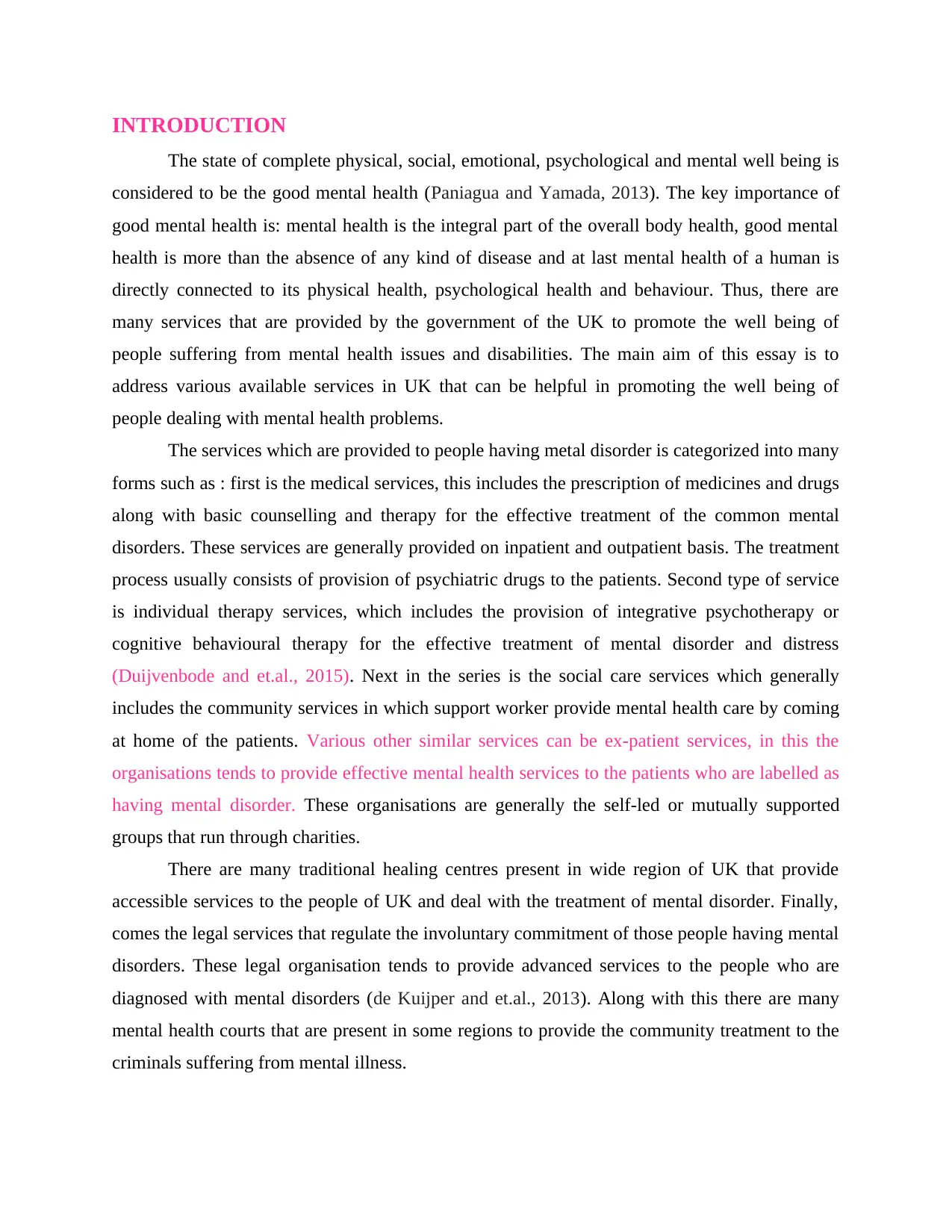
INTRODUCTION
The state of complete physical, social, emotional, psychological and mental well being is
considered to be the good mental health (Paniagua and Yamada, 2013). The key importance of
good mental health is: mental health is the integral part of the overall body health, good mental
health is more than the absence of any kind of disease and at last mental health of a human is
directly connected to its physical health, psychological health and behaviour. Thus, there are
many services that are provided by the government of the UK to promote the well being of
people suffering from mental health issues and disabilities. The main aim of this essay is to
address various available services in UK that can be helpful in promoting the well being of
people dealing with mental health problems.
The services which are provided to people having metal disorder is categorized into many
forms such as : first is the medical services, this includes the prescription of medicines and drugs
along with basic counselling and therapy for the effective treatment of the common mental
disorders. These services are generally provided on inpatient and outpatient basis. The treatment
process usually consists of provision of psychiatric drugs to the patients. Second type of service
is individual therapy services, which includes the provision of integrative psychotherapy or
cognitive behavioural therapy for the effective treatment of mental disorder and distress
(Duijvenbode and et.al., 2015). Next in the series is the social care services which generally
includes the community services in which support worker provide mental health care by coming
at home of the patients. Various other similar services can be ex-patient services, in this the
organisations tends to provide effective mental health services to the patients who are labelled as
having mental disorder. These organisations are generally the self-led or mutually supported
groups that run through charities.
There are many traditional healing centres present in wide region of UK that provide
accessible services to the people of UK and deal with the treatment of mental disorder. Finally,
comes the legal services that regulate the involuntary commitment of those people having mental
disorders. These legal organisation tends to provide advanced services to the people who are
diagnosed with mental disorders (de Kuijper and et.al., 2013). Along with this there are many
mental health courts that are present in some regions to provide the community treatment to the
criminals suffering from mental illness.
The state of complete physical, social, emotional, psychological and mental well being is
considered to be the good mental health (Paniagua and Yamada, 2013). The key importance of
good mental health is: mental health is the integral part of the overall body health, good mental
health is more than the absence of any kind of disease and at last mental health of a human is
directly connected to its physical health, psychological health and behaviour. Thus, there are
many services that are provided by the government of the UK to promote the well being of
people suffering from mental health issues and disabilities. The main aim of this essay is to
address various available services in UK that can be helpful in promoting the well being of
people dealing with mental health problems.
The services which are provided to people having metal disorder is categorized into many
forms such as : first is the medical services, this includes the prescription of medicines and drugs
along with basic counselling and therapy for the effective treatment of the common mental
disorders. These services are generally provided on inpatient and outpatient basis. The treatment
process usually consists of provision of psychiatric drugs to the patients. Second type of service
is individual therapy services, which includes the provision of integrative psychotherapy or
cognitive behavioural therapy for the effective treatment of mental disorder and distress
(Duijvenbode and et.al., 2015). Next in the series is the social care services which generally
includes the community services in which support worker provide mental health care by coming
at home of the patients. Various other similar services can be ex-patient services, in this the
organisations tends to provide effective mental health services to the patients who are labelled as
having mental disorder. These organisations are generally the self-led or mutually supported
groups that run through charities.
There are many traditional healing centres present in wide region of UK that provide
accessible services to the people of UK and deal with the treatment of mental disorder. Finally,
comes the legal services that regulate the involuntary commitment of those people having mental
disorders. These legal organisation tends to provide advanced services to the people who are
diagnosed with mental disorders (de Kuijper and et.al., 2013). Along with this there are many
mental health courts that are present in some regions to provide the community treatment to the
criminals suffering from mental illness.
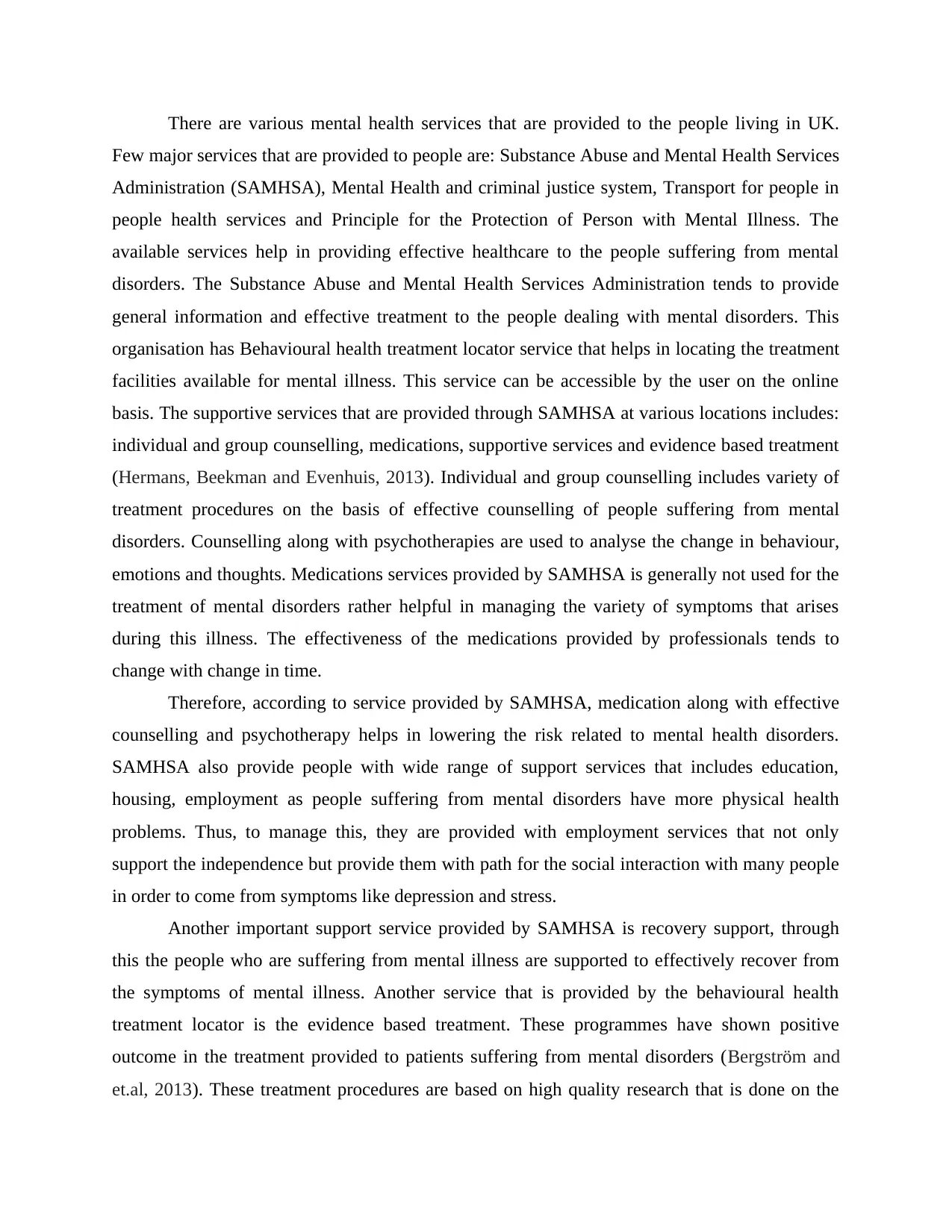
There are various mental health services that are provided to the people living in UK.
Few major services that are provided to people are: Substance Abuse and Mental Health Services
Administration (SAMHSA), Mental Health and criminal justice system, Transport for people in
people health services and Principle for the Protection of Person with Mental Illness. The
available services help in providing effective healthcare to the people suffering from mental
disorders. The Substance Abuse and Mental Health Services Administration tends to provide
general information and effective treatment to the people dealing with mental disorders. This
organisation has Behavioural health treatment locator service that helps in locating the treatment
facilities available for mental illness. This service can be accessible by the user on the online
basis. The supportive services that are provided through SAMHSA at various locations includes:
individual and group counselling, medications, supportive services and evidence based treatment
(Hermans, Beekman and Evenhuis, 2013). Individual and group counselling includes variety of
treatment procedures on the basis of effective counselling of people suffering from mental
disorders. Counselling along with psychotherapies are used to analyse the change in behaviour,
emotions and thoughts. Medications services provided by SAMHSA is generally not used for the
treatment of mental disorders rather helpful in managing the variety of symptoms that arises
during this illness. The effectiveness of the medications provided by professionals tends to
change with change in time.
Therefore, according to service provided by SAMHSA, medication along with effective
counselling and psychotherapy helps in lowering the risk related to mental health disorders.
SAMHSA also provide people with wide range of support services that includes education,
housing, employment as people suffering from mental disorders have more physical health
problems. Thus, to manage this, they are provided with employment services that not only
support the independence but provide them with path for the social interaction with many people
in order to come from symptoms like depression and stress.
Another important support service provided by SAMHSA is recovery support, through
this the people who are suffering from mental illness are supported to effectively recover from
the symptoms of mental illness. Another service that is provided by the behavioural health
treatment locator is the evidence based treatment. These programmes have shown positive
outcome in the treatment provided to patients suffering from mental disorders (Bergström and
et.al, 2013). These treatment procedures are based on high quality research that is done on the
Few major services that are provided to people are: Substance Abuse and Mental Health Services
Administration (SAMHSA), Mental Health and criminal justice system, Transport for people in
people health services and Principle for the Protection of Person with Mental Illness. The
available services help in providing effective healthcare to the people suffering from mental
disorders. The Substance Abuse and Mental Health Services Administration tends to provide
general information and effective treatment to the people dealing with mental disorders. This
organisation has Behavioural health treatment locator service that helps in locating the treatment
facilities available for mental illness. This service can be accessible by the user on the online
basis. The supportive services that are provided through SAMHSA at various locations includes:
individual and group counselling, medications, supportive services and evidence based treatment
(Hermans, Beekman and Evenhuis, 2013). Individual and group counselling includes variety of
treatment procedures on the basis of effective counselling of people suffering from mental
disorders. Counselling along with psychotherapies are used to analyse the change in behaviour,
emotions and thoughts. Medications services provided by SAMHSA is generally not used for the
treatment of mental disorders rather helpful in managing the variety of symptoms that arises
during this illness. The effectiveness of the medications provided by professionals tends to
change with change in time.
Therefore, according to service provided by SAMHSA, medication along with effective
counselling and psychotherapy helps in lowering the risk related to mental health disorders.
SAMHSA also provide people with wide range of support services that includes education,
housing, employment as people suffering from mental disorders have more physical health
problems. Thus, to manage this, they are provided with employment services that not only
support the independence but provide them with path for the social interaction with many people
in order to come from symptoms like depression and stress.
Another important support service provided by SAMHSA is recovery support, through
this the people who are suffering from mental illness are supported to effectively recover from
the symptoms of mental illness. Another service that is provided by the behavioural health
treatment locator is the evidence based treatment. These programmes have shown positive
outcome in the treatment provided to patients suffering from mental disorders (Bergström and
et.al, 2013). These treatment procedures are based on high quality research that is done on the
⊘ This is a preview!⊘
Do you want full access?
Subscribe today to unlock all pages.

Trusted by 1+ million students worldwide
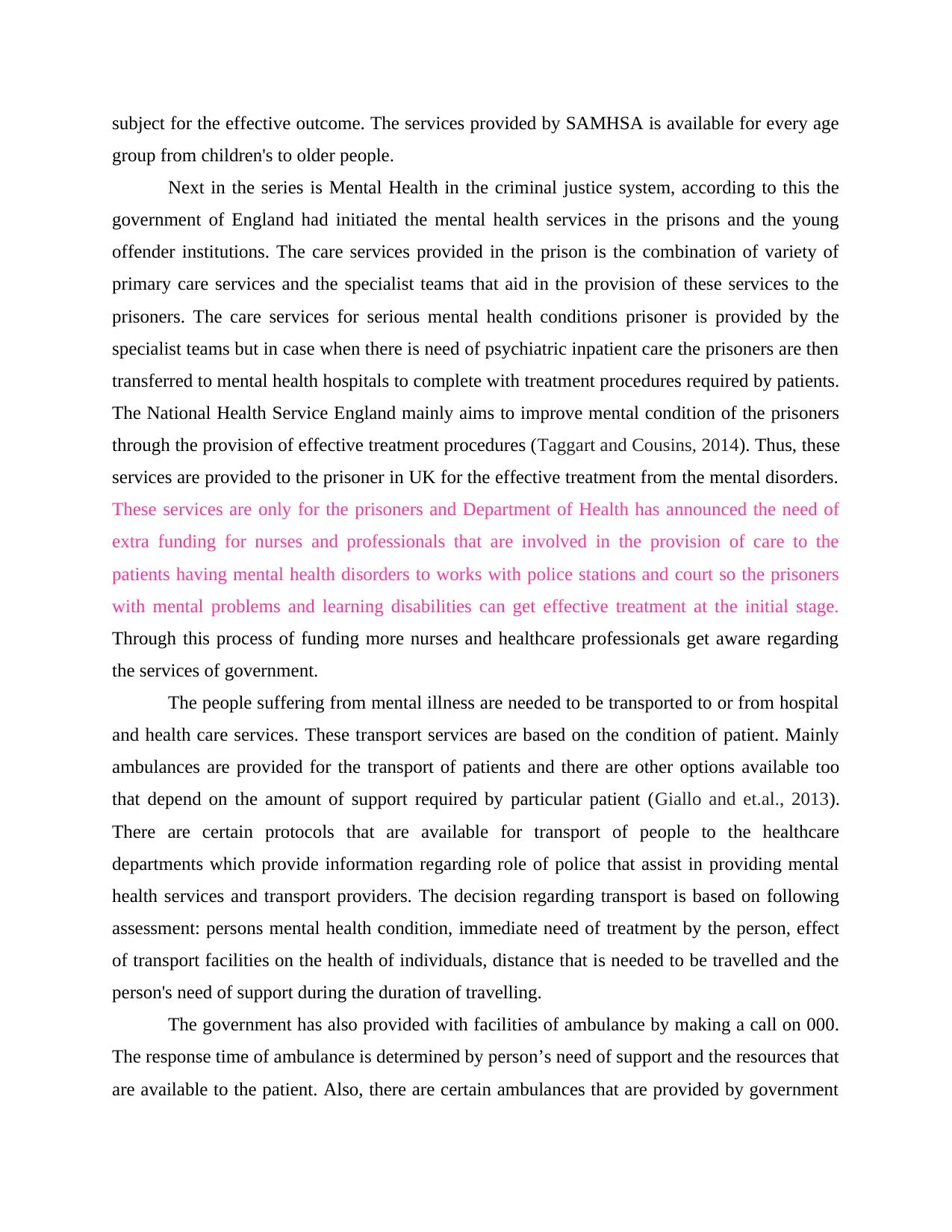
subject for the effective outcome. The services provided by SAMHSA is available for every age
group from children's to older people.
Next in the series is Mental Health in the criminal justice system, according to this the
government of England had initiated the mental health services in the prisons and the young
offender institutions. The care services provided in the prison is the combination of variety of
primary care services and the specialist teams that aid in the provision of these services to the
prisoners. The care services for serious mental health conditions prisoner is provided by the
specialist teams but in case when there is need of psychiatric inpatient care the prisoners are then
transferred to mental health hospitals to complete with treatment procedures required by patients.
The National Health Service England mainly aims to improve mental condition of the prisoners
through the provision of effective treatment procedures (Taggart and Cousins, 2014). Thus, these
services are provided to the prisoner in UK for the effective treatment from the mental disorders.
These services are only for the prisoners and Department of Health has announced the need of
extra funding for nurses and professionals that are involved in the provision of care to the
patients having mental health disorders to works with police stations and court so the prisoners
with mental problems and learning disabilities can get effective treatment at the initial stage.
Through this process of funding more nurses and healthcare professionals get aware regarding
the services of government.
The people suffering from mental illness are needed to be transported to or from hospital
and health care services. These transport services are based on the condition of patient. Mainly
ambulances are provided for the transport of patients and there are other options available too
that depend on the amount of support required by particular patient (Giallo and et.al., 2013).
There are certain protocols that are available for transport of people to the healthcare
departments which provide information regarding role of police that assist in providing mental
health services and transport providers. The decision regarding transport is based on following
assessment: persons mental health condition, immediate need of treatment by the person, effect
of transport facilities on the health of individuals, distance that is needed to be travelled and the
person's need of support during the duration of travelling.
The government has also provided with facilities of ambulance by making a call on 000.
The response time of ambulance is determined by person’s need of support and the resources that
are available to the patient. Also, there are certain ambulances that are provided by government
group from children's to older people.
Next in the series is Mental Health in the criminal justice system, according to this the
government of England had initiated the mental health services in the prisons and the young
offender institutions. The care services provided in the prison is the combination of variety of
primary care services and the specialist teams that aid in the provision of these services to the
prisoners. The care services for serious mental health conditions prisoner is provided by the
specialist teams but in case when there is need of psychiatric inpatient care the prisoners are then
transferred to mental health hospitals to complete with treatment procedures required by patients.
The National Health Service England mainly aims to improve mental condition of the prisoners
through the provision of effective treatment procedures (Taggart and Cousins, 2014). Thus, these
services are provided to the prisoner in UK for the effective treatment from the mental disorders.
These services are only for the prisoners and Department of Health has announced the need of
extra funding for nurses and professionals that are involved in the provision of care to the
patients having mental health disorders to works with police stations and court so the prisoners
with mental problems and learning disabilities can get effective treatment at the initial stage.
Through this process of funding more nurses and healthcare professionals get aware regarding
the services of government.
The people suffering from mental illness are needed to be transported to or from hospital
and health care services. These transport services are based on the condition of patient. Mainly
ambulances are provided for the transport of patients and there are other options available too
that depend on the amount of support required by particular patient (Giallo and et.al., 2013).
There are certain protocols that are available for transport of people to the healthcare
departments which provide information regarding role of police that assist in providing mental
health services and transport providers. The decision regarding transport is based on following
assessment: persons mental health condition, immediate need of treatment by the person, effect
of transport facilities on the health of individuals, distance that is needed to be travelled and the
person's need of support during the duration of travelling.
The government has also provided with facilities of ambulance by making a call on 000.
The response time of ambulance is determined by person’s need of support and the resources that
are available to the patient. Also, there are certain ambulances that are provided by government
Paraphrase This Document
Need a fresh take? Get an instant paraphrase of this document with our AI Paraphraser
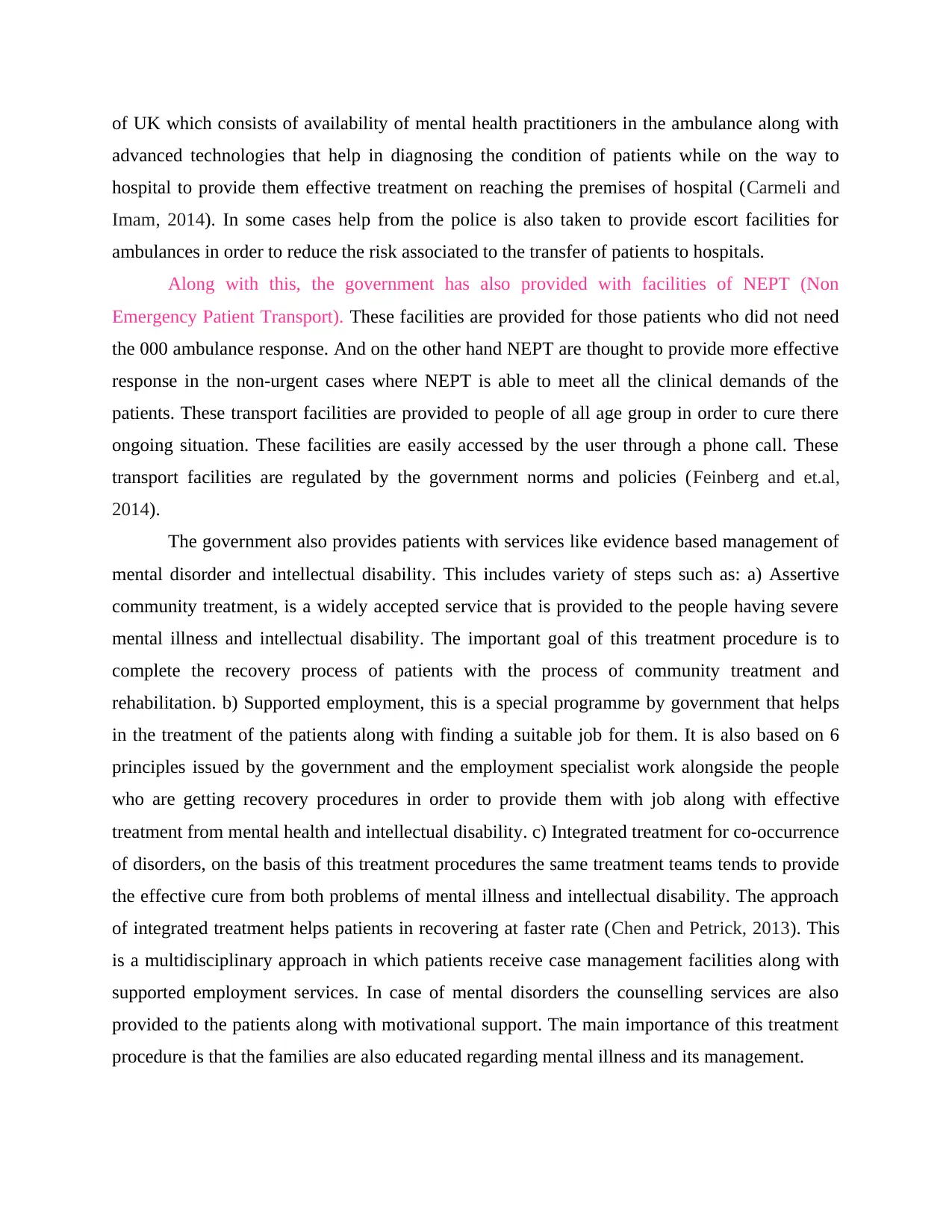
of UK which consists of availability of mental health practitioners in the ambulance along with
advanced technologies that help in diagnosing the condition of patients while on the way to
hospital to provide them effective treatment on reaching the premises of hospital (Carmeli and
Imam, 2014). In some cases help from the police is also taken to provide escort facilities for
ambulances in order to reduce the risk associated to the transfer of patients to hospitals.
Along with this, the government has also provided with facilities of NEPT (Non
Emergency Patient Transport). These facilities are provided for those patients who did not need
the 000 ambulance response. And on the other hand NEPT are thought to provide more effective
response in the non-urgent cases where NEPT is able to meet all the clinical demands of the
patients. These transport facilities are provided to people of all age group in order to cure there
ongoing situation. These facilities are easily accessed by the user through a phone call. These
transport facilities are regulated by the government norms and policies (Feinberg and et.al,
2014).
The government also provides patients with services like evidence based management of
mental disorder and intellectual disability. This includes variety of steps such as: a) Assertive
community treatment, is a widely accepted service that is provided to the people having severe
mental illness and intellectual disability. The important goal of this treatment procedure is to
complete the recovery process of patients with the process of community treatment and
rehabilitation. b) Supported employment, this is a special programme by government that helps
in the treatment of the patients along with finding a suitable job for them. It is also based on 6
principles issued by the government and the employment specialist work alongside the people
who are getting recovery procedures in order to provide them with job along with effective
treatment from mental health and intellectual disability. c) Integrated treatment for co-occurrence
of disorders, on the basis of this treatment procedures the same treatment teams tends to provide
the effective cure from both problems of mental illness and intellectual disability. The approach
of integrated treatment helps patients in recovering at faster rate (Chen and Petrick, 2013). This
is a multidisciplinary approach in which patients receive case management facilities along with
supported employment services. In case of mental disorders the counselling services are also
provided to the patients along with motivational support. The main importance of this treatment
procedure is that the families are also educated regarding mental illness and its management.
advanced technologies that help in diagnosing the condition of patients while on the way to
hospital to provide them effective treatment on reaching the premises of hospital (Carmeli and
Imam, 2014). In some cases help from the police is also taken to provide escort facilities for
ambulances in order to reduce the risk associated to the transfer of patients to hospitals.
Along with this, the government has also provided with facilities of NEPT (Non
Emergency Patient Transport). These facilities are provided for those patients who did not need
the 000 ambulance response. And on the other hand NEPT are thought to provide more effective
response in the non-urgent cases where NEPT is able to meet all the clinical demands of the
patients. These transport facilities are provided to people of all age group in order to cure there
ongoing situation. These facilities are easily accessed by the user through a phone call. These
transport facilities are regulated by the government norms and policies (Feinberg and et.al,
2014).
The government also provides patients with services like evidence based management of
mental disorder and intellectual disability. This includes variety of steps such as: a) Assertive
community treatment, is a widely accepted service that is provided to the people having severe
mental illness and intellectual disability. The important goal of this treatment procedure is to
complete the recovery process of patients with the process of community treatment and
rehabilitation. b) Supported employment, this is a special programme by government that helps
in the treatment of the patients along with finding a suitable job for them. It is also based on 6
principles issued by the government and the employment specialist work alongside the people
who are getting recovery procedures in order to provide them with job along with effective
treatment from mental health and intellectual disability. c) Integrated treatment for co-occurrence
of disorders, on the basis of this treatment procedures the same treatment teams tends to provide
the effective cure from both problems of mental illness and intellectual disability. The approach
of integrated treatment helps patients in recovering at faster rate (Chen and Petrick, 2013). This
is a multidisciplinary approach in which patients receive case management facilities along with
supported employment services. In case of mental disorders the counselling services are also
provided to the patients along with motivational support. The main importance of this treatment
procedure is that the families are also educated regarding mental illness and its management.
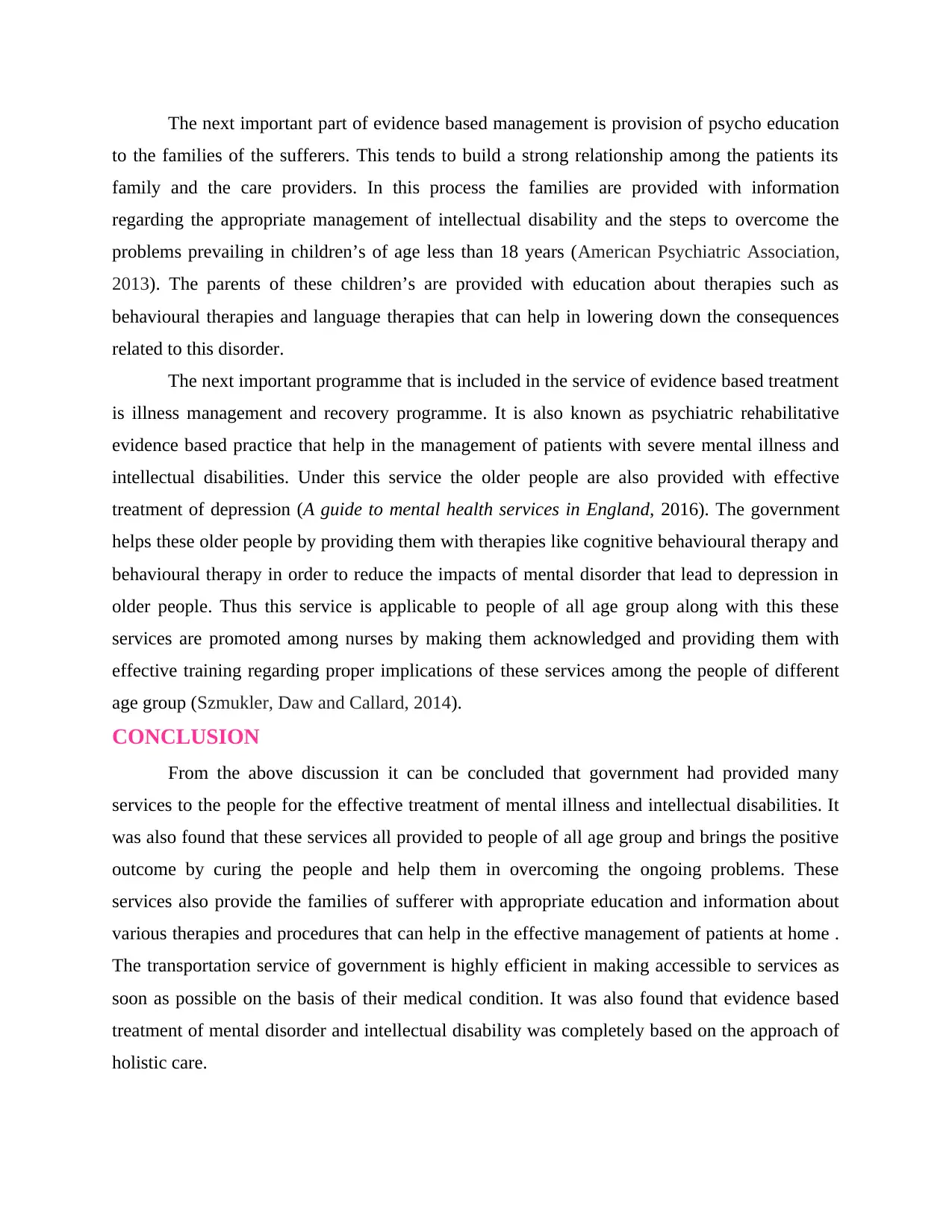
The next important part of evidence based management is provision of psycho education
to the families of the sufferers. This tends to build a strong relationship among the patients its
family and the care providers. In this process the families are provided with information
regarding the appropriate management of intellectual disability and the steps to overcome the
problems prevailing in children’s of age less than 18 years (American Psychiatric Association,
2013). The parents of these children’s are provided with education about therapies such as
behavioural therapies and language therapies that can help in lowering down the consequences
related to this disorder.
The next important programme that is included in the service of evidence based treatment
is illness management and recovery programme. It is also known as psychiatric rehabilitative
evidence based practice that help in the management of patients with severe mental illness and
intellectual disabilities. Under this service the older people are also provided with effective
treatment of depression (A guide to mental health services in England, 2016). The government
helps these older people by providing them with therapies like cognitive behavioural therapy and
behavioural therapy in order to reduce the impacts of mental disorder that lead to depression in
older people. Thus this service is applicable to people of all age group along with this these
services are promoted among nurses by making them acknowledged and providing them with
effective training regarding proper implications of these services among the people of different
age group (Szmukler, Daw and Callard, 2014).
CONCLUSION
From the above discussion it can be concluded that government had provided many
services to the people for the effective treatment of mental illness and intellectual disabilities. It
was also found that these services all provided to people of all age group and brings the positive
outcome by curing the people and help them in overcoming the ongoing problems. These
services also provide the families of sufferer with appropriate education and information about
various therapies and procedures that can help in the effective management of patients at home .
The transportation service of government is highly efficient in making accessible to services as
soon as possible on the basis of their medical condition. It was also found that evidence based
treatment of mental disorder and intellectual disability was completely based on the approach of
holistic care.
to the families of the sufferers. This tends to build a strong relationship among the patients its
family and the care providers. In this process the families are provided with information
regarding the appropriate management of intellectual disability and the steps to overcome the
problems prevailing in children’s of age less than 18 years (American Psychiatric Association,
2013). The parents of these children’s are provided with education about therapies such as
behavioural therapies and language therapies that can help in lowering down the consequences
related to this disorder.
The next important programme that is included in the service of evidence based treatment
is illness management and recovery programme. It is also known as psychiatric rehabilitative
evidence based practice that help in the management of patients with severe mental illness and
intellectual disabilities. Under this service the older people are also provided with effective
treatment of depression (A guide to mental health services in England, 2016). The government
helps these older people by providing them with therapies like cognitive behavioural therapy and
behavioural therapy in order to reduce the impacts of mental disorder that lead to depression in
older people. Thus this service is applicable to people of all age group along with this these
services are promoted among nurses by making them acknowledged and providing them with
effective training regarding proper implications of these services among the people of different
age group (Szmukler, Daw and Callard, 2014).
CONCLUSION
From the above discussion it can be concluded that government had provided many
services to the people for the effective treatment of mental illness and intellectual disabilities. It
was also found that these services all provided to people of all age group and brings the positive
outcome by curing the people and help them in overcoming the ongoing problems. These
services also provide the families of sufferer with appropriate education and information about
various therapies and procedures that can help in the effective management of patients at home .
The transportation service of government is highly efficient in making accessible to services as
soon as possible on the basis of their medical condition. It was also found that evidence based
treatment of mental disorder and intellectual disability was completely based on the approach of
holistic care.
⊘ This is a preview!⊘
Do you want full access?
Subscribe today to unlock all pages.

Trusted by 1+ million students worldwide
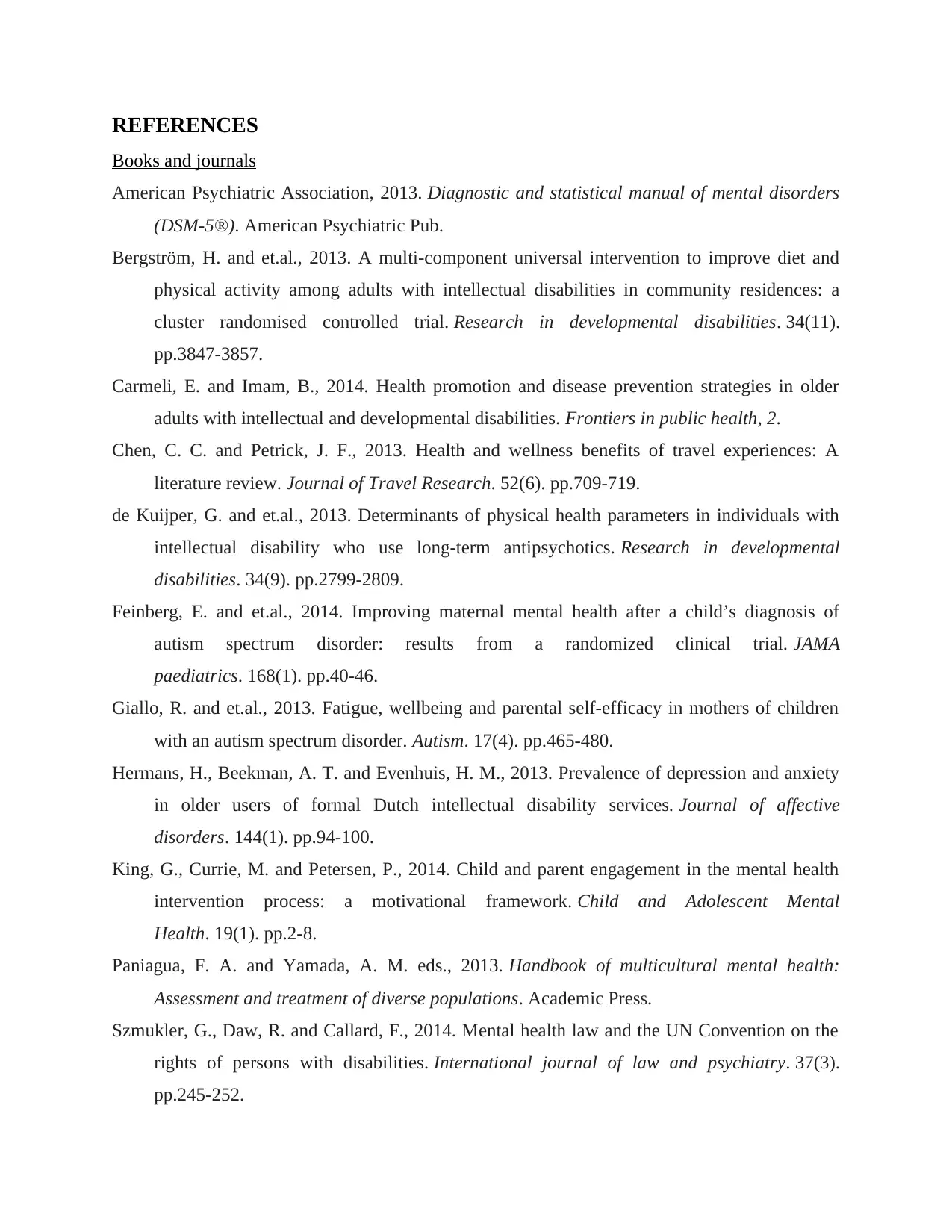
REFERENCES
Books and journals
American Psychiatric Association, 2013. Diagnostic and statistical manual of mental disorders
(DSM-5®). American Psychiatric Pub.
Bergström, H. and et.al., 2013. A multi-component universal intervention to improve diet and
physical activity among adults with intellectual disabilities in community residences: a
cluster randomised controlled trial. Research in developmental disabilities. 34(11).
pp.3847-3857.
Carmeli, E. and Imam, B., 2014. Health promotion and disease prevention strategies in older
adults with intellectual and developmental disabilities. Frontiers in public health, 2.
Chen, C. C. and Petrick, J. F., 2013. Health and wellness benefits of travel experiences: A
literature review. Journal of Travel Research. 52(6). pp.709-719.
de Kuijper, G. and et.al., 2013. Determinants of physical health parameters in individuals with
intellectual disability who use long-term antipsychotics. Research in developmental
disabilities. 34(9). pp.2799-2809.
Feinberg, E. and et.al., 2014. Improving maternal mental health after a child’s diagnosis of
autism spectrum disorder: results from a randomized clinical trial. JAMA
paediatrics. 168(1). pp.40-46.
Giallo, R. and et.al., 2013. Fatigue, wellbeing and parental self-efficacy in mothers of children
with an autism spectrum disorder. Autism. 17(4). pp.465-480.
Hermans, H., Beekman, A. T. and Evenhuis, H. M., 2013. Prevalence of depression and anxiety
in older users of formal Dutch intellectual disability services. Journal of affective
disorders. 144(1). pp.94-100.
King, G., Currie, M. and Petersen, P., 2014. Child and parent engagement in the mental health
intervention process: a motivational framework. Child and Adolescent Mental
Health. 19(1). pp.2-8.
Paniagua, F. A. and Yamada, A. M. eds., 2013. Handbook of multicultural mental health:
Assessment and treatment of diverse populations. Academic Press.
Szmukler, G., Daw, R. and Callard, F., 2014. Mental health law and the UN Convention on the
rights of persons with disabilities. International journal of law and psychiatry. 37(3).
pp.245-252.
Books and journals
American Psychiatric Association, 2013. Diagnostic and statistical manual of mental disorders
(DSM-5®). American Psychiatric Pub.
Bergström, H. and et.al., 2013. A multi-component universal intervention to improve diet and
physical activity among adults with intellectual disabilities in community residences: a
cluster randomised controlled trial. Research in developmental disabilities. 34(11).
pp.3847-3857.
Carmeli, E. and Imam, B., 2014. Health promotion and disease prevention strategies in older
adults with intellectual and developmental disabilities. Frontiers in public health, 2.
Chen, C. C. and Petrick, J. F., 2013. Health and wellness benefits of travel experiences: A
literature review. Journal of Travel Research. 52(6). pp.709-719.
de Kuijper, G. and et.al., 2013. Determinants of physical health parameters in individuals with
intellectual disability who use long-term antipsychotics. Research in developmental
disabilities. 34(9). pp.2799-2809.
Feinberg, E. and et.al., 2014. Improving maternal mental health after a child’s diagnosis of
autism spectrum disorder: results from a randomized clinical trial. JAMA
paediatrics. 168(1). pp.40-46.
Giallo, R. and et.al., 2013. Fatigue, wellbeing and parental self-efficacy in mothers of children
with an autism spectrum disorder. Autism. 17(4). pp.465-480.
Hermans, H., Beekman, A. T. and Evenhuis, H. M., 2013. Prevalence of depression and anxiety
in older users of formal Dutch intellectual disability services. Journal of affective
disorders. 144(1). pp.94-100.
King, G., Currie, M. and Petersen, P., 2014. Child and parent engagement in the mental health
intervention process: a motivational framework. Child and Adolescent Mental
Health. 19(1). pp.2-8.
Paniagua, F. A. and Yamada, A. M. eds., 2013. Handbook of multicultural mental health:
Assessment and treatment of diverse populations. Academic Press.
Szmukler, G., Daw, R. and Callard, F., 2014. Mental health law and the UN Convention on the
rights of persons with disabilities. International journal of law and psychiatry. 37(3).
pp.245-252.
Paraphrase This Document
Need a fresh take? Get an instant paraphrase of this document with our AI Paraphraser
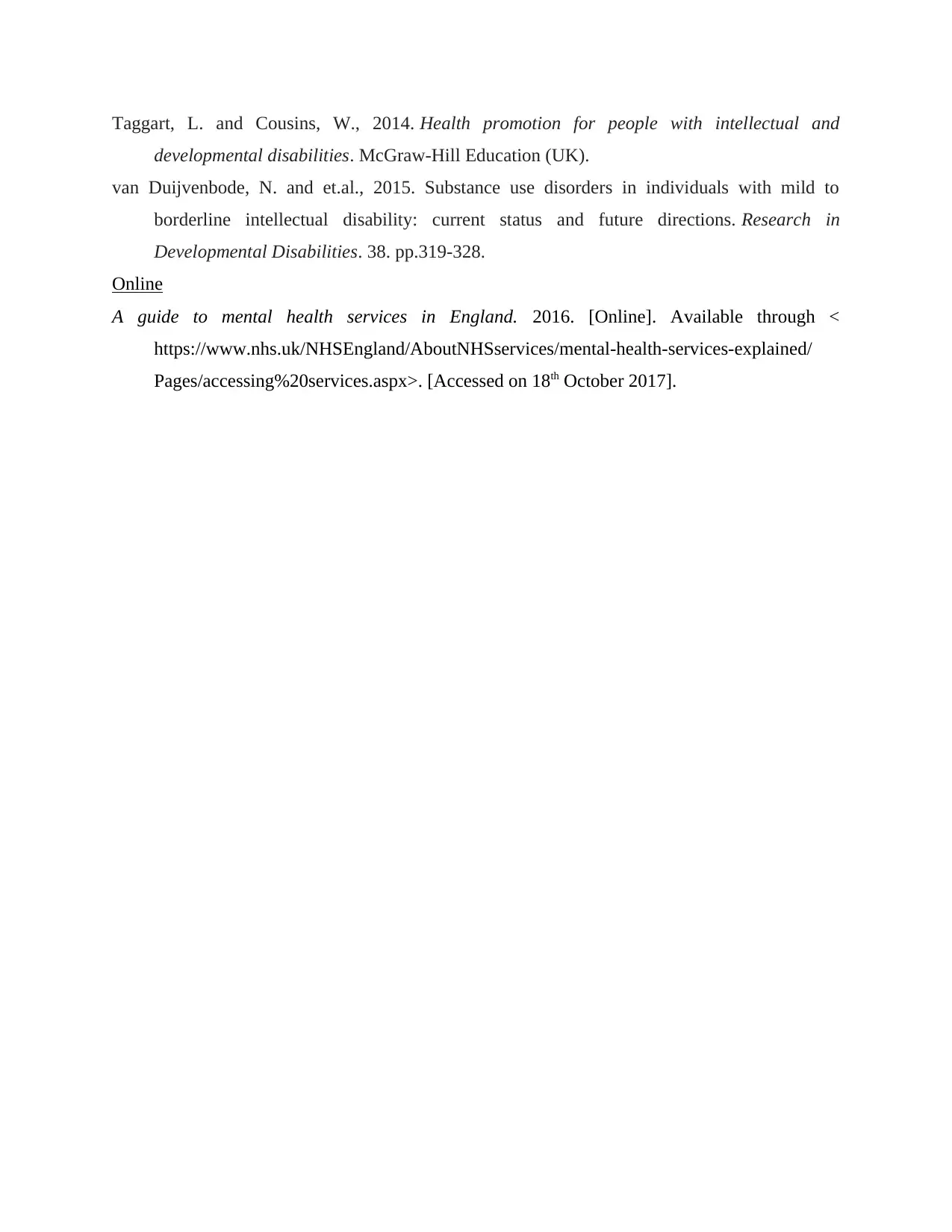
Taggart, L. and Cousins, W., 2014. Health promotion for people with intellectual and
developmental disabilities. McGraw-Hill Education (UK).
van Duijvenbode, N. and et.al., 2015. Substance use disorders in individuals with mild to
borderline intellectual disability: current status and future directions. Research in
Developmental Disabilities. 38. pp.319-328.
Online
A guide to mental health services in England. 2016. [Online]. Available through <
https://www.nhs.uk/NHSEngland/AboutNHSservices/mental-health-services-explained/
Pages/accessing%20services.aspx>. [Accessed on 18th October 2017].
developmental disabilities. McGraw-Hill Education (UK).
van Duijvenbode, N. and et.al., 2015. Substance use disorders in individuals with mild to
borderline intellectual disability: current status and future directions. Research in
Developmental Disabilities. 38. pp.319-328.
Online
A guide to mental health services in England. 2016. [Online]. Available through <
https://www.nhs.uk/NHSEngland/AboutNHSservices/mental-health-services-explained/
Pages/accessing%20services.aspx>. [Accessed on 18th October 2017].
1 out of 8
Related Documents
Your All-in-One AI-Powered Toolkit for Academic Success.
+13062052269
info@desklib.com
Available 24*7 on WhatsApp / Email
![[object Object]](/_next/static/media/star-bottom.7253800d.svg)
Unlock your academic potential
Copyright © 2020–2026 A2Z Services. All Rights Reserved. Developed and managed by ZUCOL.





